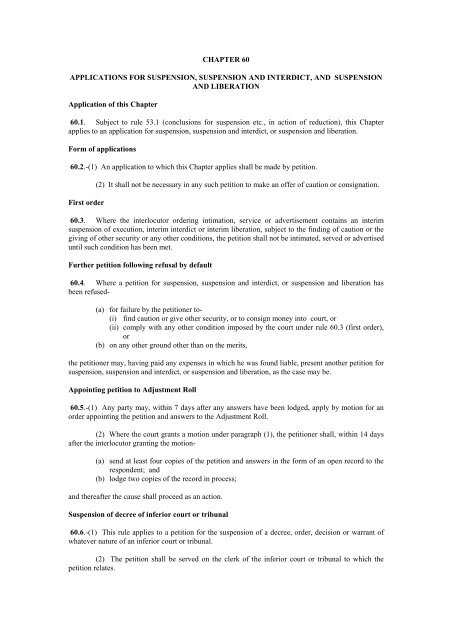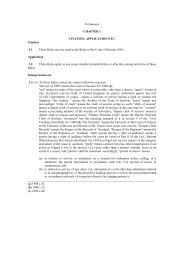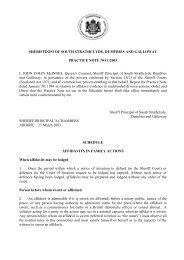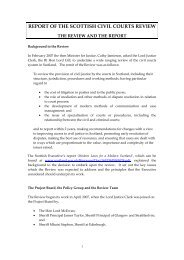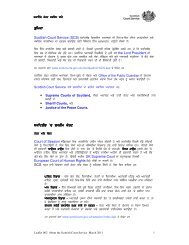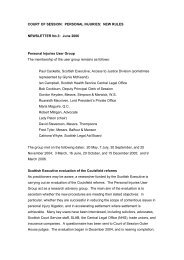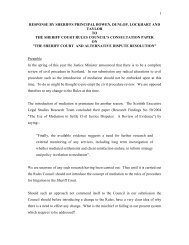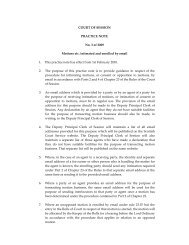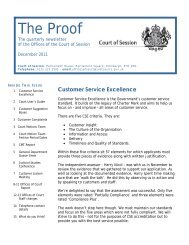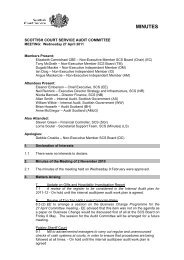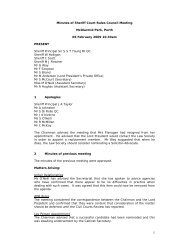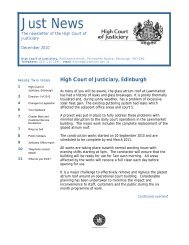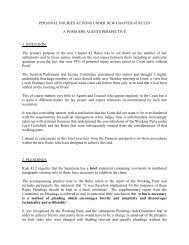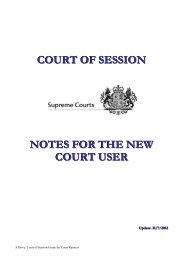Chapter 60 Applications for Suspension, Suspension and Interdict ...
Chapter 60 Applications for Suspension, Suspension and Interdict ...
Chapter 60 Applications for Suspension, Suspension and Interdict ...
You also want an ePaper? Increase the reach of your titles
YUMPU automatically turns print PDFs into web optimized ePapers that Google loves.
CHAPTER <strong>60</strong>APPLICATIONS FOR SUSPENSION, SUSPENSION AND INTERDICT, AND SUSPENSIONAND LIBERATIONApplication of this <strong>Chapter</strong><strong>60</strong>.1. Subject to rule 53.1 (conclusions <strong>for</strong> suspension etc., in action of reduction), this <strong>Chapter</strong>applies to an application <strong>for</strong> suspension, suspension <strong>and</strong> interdict, or suspension <strong>and</strong> liberation.Form of applications<strong>60</strong>.2.-(1) An application to which this <strong>Chapter</strong> applies shall be made by petition.First order(2) It shall not be necessary in any such petition to make an offer of caution or consignation.<strong>60</strong>.3. Where the interlocutor ordering intimation, service or advertisement contains an interimsuspension of execution, interim interdict or interim liberation, subject to the finding of caution or thegiving of other security or any other conditions, the petition shall not be intimated, served or advertiseduntil such condition has been met.Further petition following refusal by default<strong>60</strong>.4. Where a petition <strong>for</strong> suspension, suspension <strong>and</strong> interdict, or suspension <strong>and</strong> liberation hasbeen refused-(a) <strong>for</strong> failure by the petitioner to-(i) find caution or give other security, or to consign money into court, or(ii) comply with any other condition imposed by the court under rule <strong>60</strong>.3 (first order),or(b) on any other ground other than on the merits,the petitioner may, having paid any expenses in which he was found liable, present another petition <strong>for</strong>suspension, suspension <strong>and</strong> interdict, or suspension <strong>and</strong> liberation, as the case may be.Appointing petition to Adjustment Roll<strong>60</strong>.5.-(1) Any party may, within 7 days after any answers have been lodged, apply by motion <strong>for</strong> anorder appointing the petition <strong>and</strong> answers to the Adjustment Roll.(2) Where the court grants a motion under paragraph (1), the petitioner shall, within 14 daysafter the interlocutor granting the motion-(a) send at least four copies of the petition <strong>and</strong> answers in the <strong>for</strong>m of an open record to therespondent; <strong>and</strong>(b) lodge two copies of the record in process;<strong>and</strong> thereafter the cause shall proceed as an action.<strong>Suspension</strong> of decree of inferior court or tribunal<strong>60</strong>.6.-(1) This rule applies to a petition <strong>for</strong> the suspension of a decree, order, decision or warrant ofwhatever nature of an inferior court or tribunal.(2) The petition shall be served on the clerk of the inferior court or tribunal to which thepetition relates.
(3) The Lord Ordinary may pronounce an interlocutor ordering production to the court of anypart of the proceedings in the inferior court or tribunal within such period as he thinks fit.(4) On an interlocutor being pronounced under paragraph (1), the petitioner shall exhibit tothe clerk of the inferior court or tribunal a certified copy of the interlocutor; <strong>and</strong> that clerk shalltransmit the documents ordered to be produced to the Deputy Principal Clerk.(5) Where the petitioner fails to comply with the requirement on him under paragraph (4), thepetition shall be refused.(6) An interlocutor granting suspension shall include a direction to the clerk of court to senda copy of the interlocutor by post to the clerk of the inferior court or tribunal on whom service wasexecuted under paragraph (2).(7) Where an interlocutor granting suspension is reclaimed against, the reclaimer shall givewritten intimation of that fact to the clerk of the inferior court or tribunal as soon as possible after thereclaiming motion has been marked.(8) The interlocutor disposing of such a reclaiming motion shall include a direction to theclerk of court to send a copy of that interlocutor to the clerk of the inferior court or tribunal on whomservice was executed under paragraph (2).Interlocutor refusing suspension after proof<strong>60</strong>.7. Where the Lord Ordinary, after a proof, refuses a petition <strong>for</strong> suspension of a decree ordecision of an inferior court or tribunal, he shall specify in his interlocutor the relevant facts of the casewhich he finds to be established <strong>and</strong> the points of law which he has applied to such facts.


